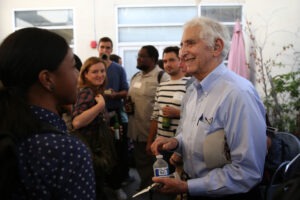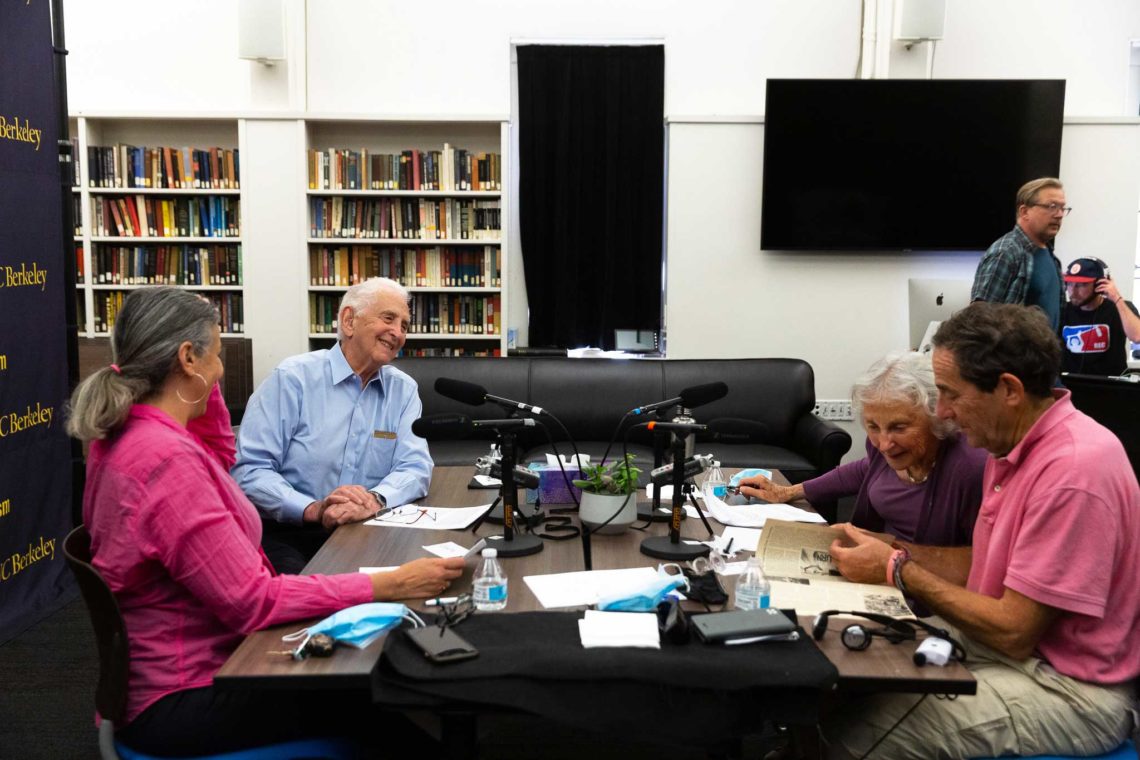Following the recent death of Advisory Board member Daniel Ellsberg, a beloved and active member of the school, the Investigative Reporting Program has established a Daniel Ellsberg Whistleblower in Residence program. The program will bring a whistleblower into the school for a week every year to teach students how to work hand in hand with whistleblowers to make sure their stories are told and they are protected.
Geeta Anand, dean of Berkeley Journalism, said the hope is to spur journalists to look critically at how we treat whistleblowers and to explore best practices in the way whistleblowers are protected by news organizations. “All journalists in the world need to learn from people like Dan Ellsberg about the importance of courageous truth-telling,” Anand said. “There are some things that are worth fighting for — truth, freedom and justice are high on that list. And journalism, good journalism, needs to be based in truth, in freedom and in justice.”
Each spring, Berkeley Journalism will invite a whistleblower to meet with students, visit classes and speak at the Logan Symposium.
“The word “whistleblower” is so inadequate to describe the Dan Ellsberg’s of this world,” Prof. David Barstow, chair of the Investigative Reporting Program, said. “It doesn’t even come close to capturing the radical courage it takes to divulge abuses of power at the highest levels of government or business or anything else. In my own dealings with whistleblowers, it amazes me how often they will invoke the ‘Pentagon Papers guy’ as the inspiration for their own radical courage.”

Daniel Ellsberg speaks with students at the UC Berkeley Graduate School of Journalism in 2014. (Alex Menendez)
Ellsberg was a familiar face on campus and generously came to the school to explain the history of the Pentagon Papers to incoming graduate students, who often did not know it. As former dean Edward Wasserman wrote in his remembrance of Ellsberg in The San Francisco Chronicle:
Watching Dan interact with the Berkeley students brought out a side to him that is missing from most of the remembrances. He was well into his 80s and his hearing was poor, and he was talking at length and without notes to a student population that had never heard of Dean Rusk or the Tonkin Gulf affair — the bogus 1964 naval skirmish used to hoodwink Congress into authorizing a war — or any of the other threads out of which the Vietnam fraud was woven.
But there was a kindness and a humility to the man, as well as a staggering command of decades-old detail, and the students were enthralled. Instead of bolting for the exits when he was done with his presentation and the Q&A session was officially over, they thronged to the podium and kept him talking. They wouldn’t let him go. He had a presence, and they felt it.
The faculty was equally enamored with Ellsberg. “If it were up to me, I’d put Dan’s face on the $20 bill and the next postage stamp, and then I’d build a display in his honor at the Smithsonian,” Barstow said. “After a lifetime of investigative reporting, the one thing I know for sure is that the journalism that makes history and exposes the deepest of wrongs is almost always built around heroes like Dan Ellsberg.”
In the months following his diagnosis in February, Ellsberg continued to speak out about a world increasingly vulnerable to the dangers of nuclear war, and the fate of whistleblowers, including via Zoom at the 15th Annual Logan Symposium in Investigative Reporting, in April.
His fierce intelligence and passion were ever-present, despite his prognosis.
In an auditorium packed with some of the nation’s top investigative reporters, he urged them to examine their relationship with sources. “I have yet to meet a whistleblower who has a “good feeling” about the institution they dealt with, the newspaper they dealt with, or the reporter that they dealt with in the end,” Ellsberg said. They gave him two standing ovations.
Watch Ellsberg and fellow whistleblower Reality Winner, on “Prosecuting Whistleblowers/Criminalizing Journalism” panel moderated by Ron Nixon here.

Daniel Ellsberg speaking to students with Dean Edward Wasserman.
Capturing a different side of Ellsberg
In 2021, on the 50th anniversary of the release of the Pentagon Papers, Anand interviewed Ellsberg and his wife, Patricia, to probe the “civic courage” that prompted the release of the Pentagon Papers — and the spiritual strength it took to survive. She was joined by Robert Rosenthal, who worked as a clerk for The New York Times as it was publishing stories based on the leaked documents.

Clockwise from left to right: Geeta Anand, Daniel Ellsberg, Patricia Ellsberg and Robert Rosenthal recording a podcast on the emotional challenge of whistleblowing in June 2021. Photo: Brian Nguyen (’22)
In it, Ellsberg argues there’s a form of courage that is rarely talked about: “civic courage,” which is when government officials, exposed to wrongdoing, risk their jobs and the livelihoods of their families to expose wrongdoing by their governments or their companies.
The podcast also touches on how the death of Daniel’s mother and sister in a car crash in his youth influenced his becoming a whistleblower. “It’s sort of like being a canary in the coal mine,” he said. “I am perhaps a little more sensitive than others to the possibility of disaster and [have] a sense of obligation to try to avert that. Some people call that survivor guilt or survivor syndrome.”
Other connections
Ellsberg also is connected to the J-School by an integral member of the Pentagon Papers team. Ben Bagdikian —The Washington Post’s conduit for the Pentagon Papers — would become a longtime professor and dean of the School in the late 1970s. The story of Bagdikian obtaining the Pentagon Papers for The Post, flying on a plane with them and physically delivering them to the home of then-editor Ben Bradlee was reconstructed in the Steven Spielberg film “The Post,” starring Tom Hanks and Meryl Streep, with Matthew Rhys playing Ellsberg and Bob Odenkirk playing Bagdikian.

Daniel Ellsberg flashes two peace signs via Zoom at the 15th Annual Logan Symposium in Investigative Reporting, in April.
Ellsberg’s family will be arranging a public Zoom memorial in the coming months. It will be announced on Daniel’s Twitter and Facebook accounts, and on ours.
Rest in power, Daniel.
–Marlena Telvick
Want to learn more about how to support the new whistleblower in residence program?
Contact stevekatz@berkeley.edu.

